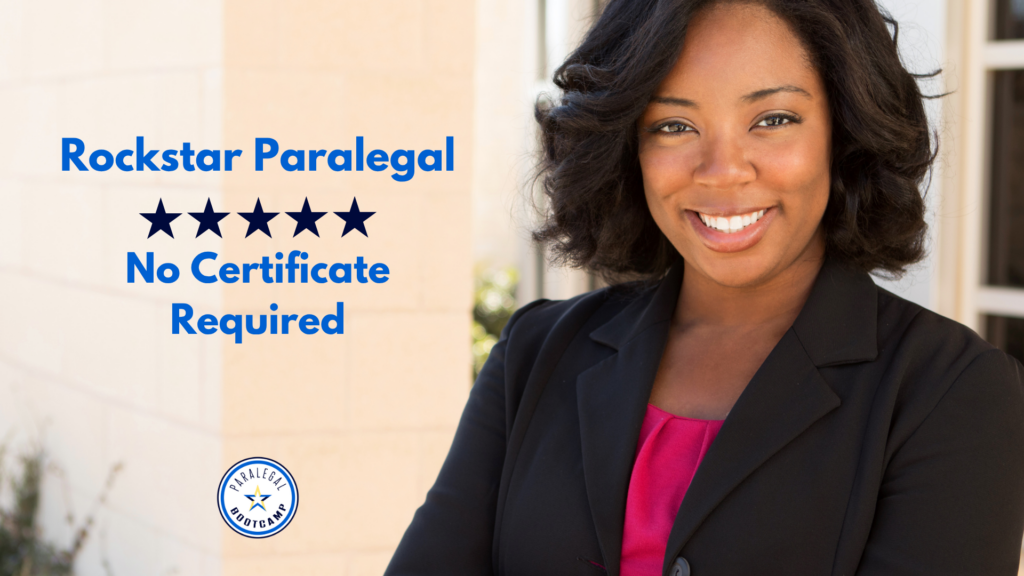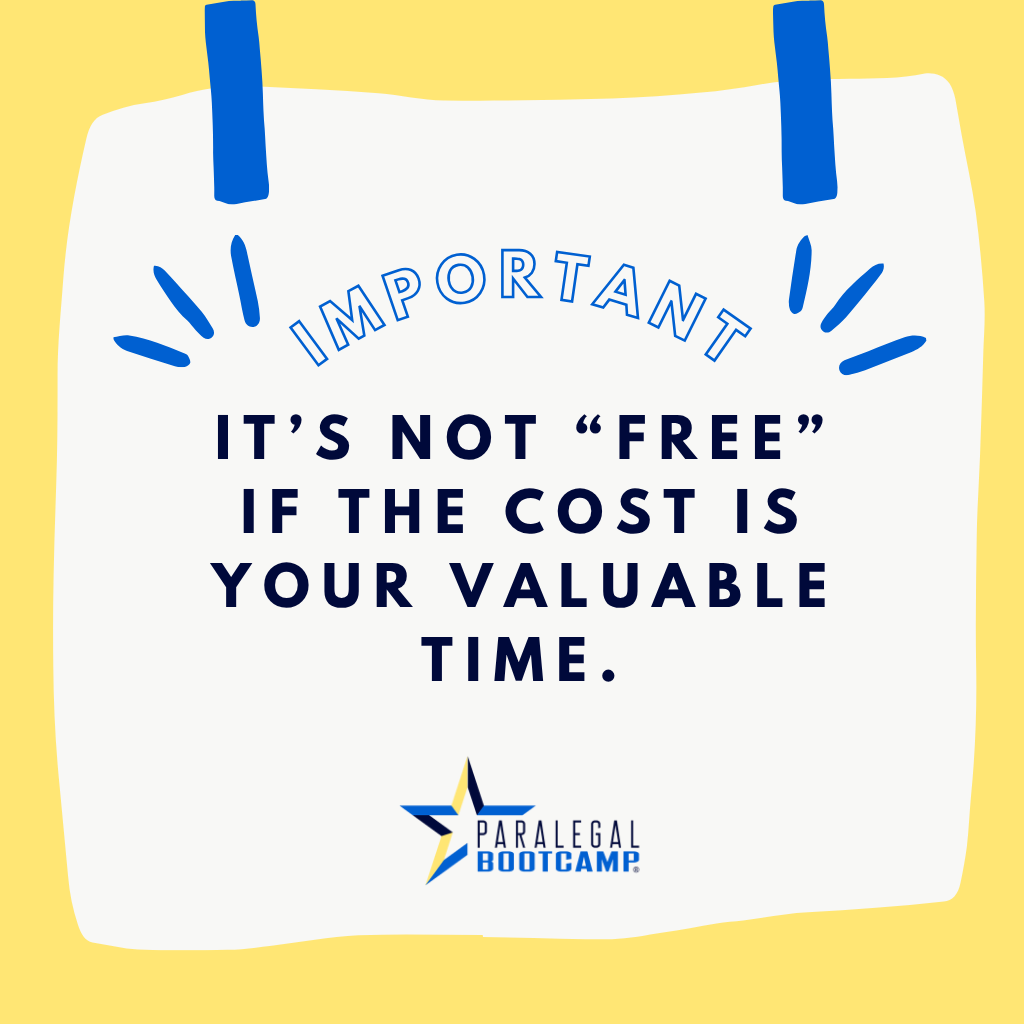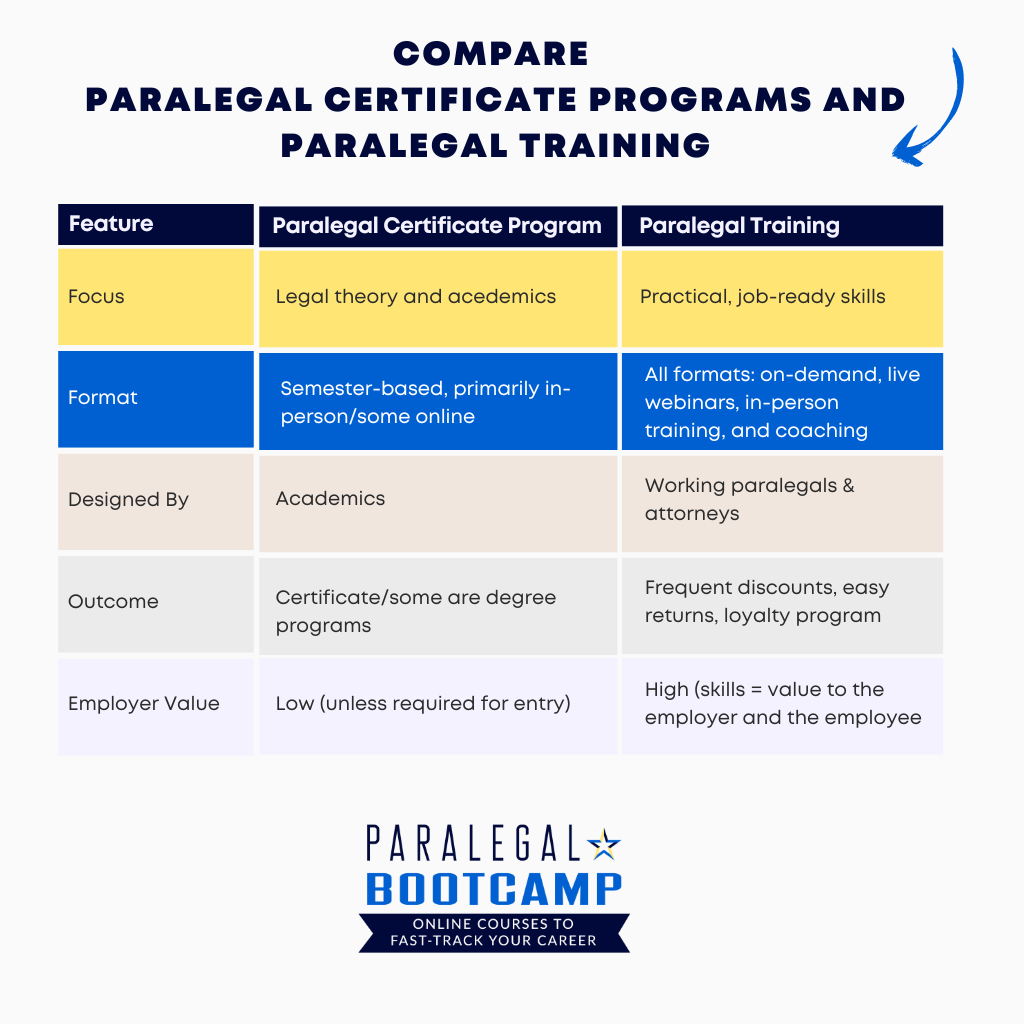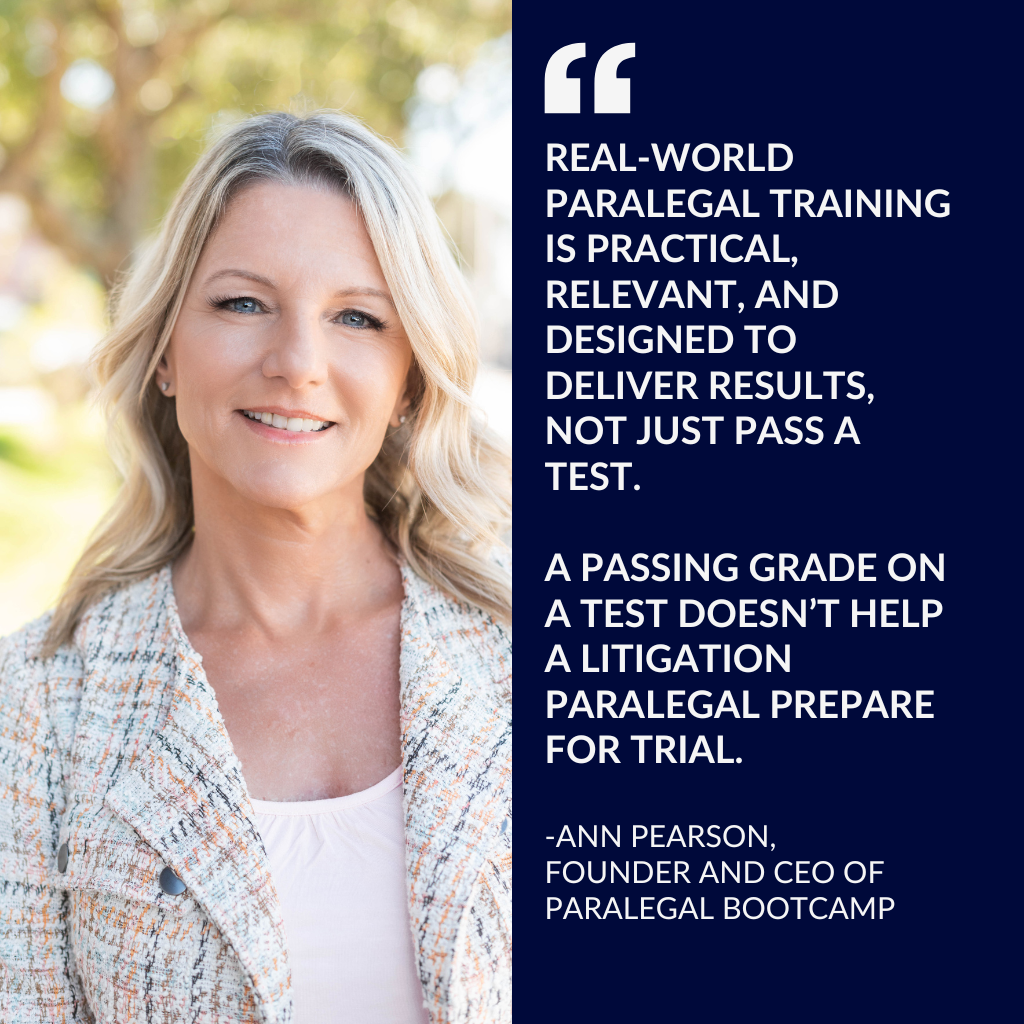Table of Contents
What is paralegal training?
Think all paralegal training is the same? Think again.
Paralegal training is a learning event that changes behavior or adds a skill. Paralegal training is not someone on a webinar reading the bullet points from a PowerPoint slide. You can get that in an audiobook.
Paralegal training is also not the same as a paralegal certificate program. A paralegal certificate program is schooling, not training.
Did you know that most law firms hire for skills, not certificates?
How do I know this? I’ve spent 30+ years working in the legal industry.
I remember when I was a paralegal manager, I was so impressed during the interview of a recent college graduate in 2006 that I hired her as a litigation paralegal even though she did not have a paralegal certificate. That wasn’t common for the firm back then, but I saw something in the interview that didn’t have anything to do with a piece of paper.
I provided her with skills-based litigation training that I had developed as an internal law firm training program that allowed me to hire entry-level paralegals. I mentored and coached her. Within a couple of years, the attorneys on her team were referring to her as their “rockstar paralegal.”
It wasn’t 10 years later. It was 2-3 years after I hired her.
🔥 That transformation didn’t happen from a paralegal certificate.
It happened through training that added practical paralegal skills. And that’s the difference that’s important for all legal professionals to understand when they’re choosing between what training to spend their money on.

Real-world paralegal training sets high-performing paralegals apart from average performers. Those are the paralegal skills and attributes acquired after a student’s formal education, and they include things like:
✅ Anticipating attorneys’ needs
✅ Managing complex projects with little supervision
✅ Being resourceful and solutions-oriented
✅ Navigating the chaos of tight deadlines with confidence and professionalism
Law firm managers utilize the Paralegal Boot Camp for their law firm training to equip their legal professionals with those skills and more.
What paralegal training is not:
❌ A 10-year-old webinar buried in an “All Access Pass” on-demand library
❌ Your paralegal mentor assigned to you on your first day, took you out to lunch, and you haven’t seen them since
❌ A $79 CLE taught by an attorney updating paralegals on case law and regulations
❌ A cheap “paralegal membership” that gives you enough CLE credits to meet your obligations (even though half of them have nothing to do with your practice area, but you take them anyway, “just to get the credits”)
❌ A free “Lunch and Learn” from a vendor who spends the first 20 minutes talking about themselves and their product, the next 20 minutes teaching, and the last 20 minutes selling
No one has the time to sit through a 60-minute presentation that doesn’t add immediate value to their career. It’s not free if the cost is your valuable time.

Don't confuse a certified paralegal with a paralegal certificate
What does this have to do with a discussion about paralegal training?
If you do a Google search for paralegal training, the paralegal certificate programs have monopolized the search results such that most people now confuse paralegal training with a paralegal certificate. That needs to change, because people looking for paralegal education or paralegal degrees are not the same as people looking for paralegal training.
I had to include this section here to satisfy Google search results. If you’re looking for paralegal training, skip to the next section. If you’re new to the profession and you don’t know the difference, then please don’t skip it because the confusion needs to be cleared up.
Many people new to the paralegal profession confuse the “certified paralegal vs. paralegal certificate.” That will be a deep dive article for another day. Here are the cliff notes:
A paralegal who graduates from a paralegal certificate program is a person who has obtained a paralegal certificate. Some of those certificates are obtained from non-profit colleges and universities after an undergraduate degree or as part of an undergraduate degree, and some are certificate-only programs from for-profit businesses that have a business name that sounds like a school name.
A certified paralegal is someone who voluntarily takes and passes one of the many paralegal certification exams through their state or a national association (e.g., R.P. from National Federation Paralegal Associations “NFPA,” and the Texas Board of Legal Specialization, to name only two examples). Usually, in order to sit for those certification exams, a paralegal has to already have a paralegal certificate from an accredited school.
There are also states that have voluntary certifications that do not require taking an exam, and instead offer registration or certification through qualification standards, such as Florida. Those states require the paralegals to complete a certain number of CLE credits to renew their certification.
Paralegal certificate programs are not the same as training
Paralegal certificate programs are great for building foundational knowledge, but they’re just the beginning. Expecting to thrive in a law firm after graduation without continuous development is like expecting to swim in the Olympics after reading a book on how to float.
If you asked 50 paralegals who all went to 50 different paralegal certificate programs, they would all tell you the same thing: the schools taught us theory and terminology, but not the skills that were needed when on the first day of that first paralegal job.
I also hear from paralegal managers and law firm administrators who don’t hire entry-level paralegals because they don’t have the capacity to do the full paralegal training that would be required to bring a new paralegal graduate up to the skill level that their attorneys need.
In defense of all paralegal certificate programs, it would be difficult to teach every skill a paralegal might use at every different type of employer in dozens of different practice areas. The skills that you need as a litigation paralegal in a law firm are going to be completely different than the skills you need as a commercial real estate paralegal working in-house.
🏆 Paralegal Boot Camp has been providing training for paralegals since 2010. The training bridges the gap between what the schools teach and the real-world skills a paralegal needs on the job.

Is paralegal CLE the same as paralegal training?
Paralegal continuing legal education (CLE) refers to the education credits required for paralegals to meet when a paralegal has to comply with their certification requirements. The certification requirements depend on the VOLUNTARY certification test that a paralegal chooses to take after graduating from a paralegal certificate program.
Too often, in a rush to get those coveted CLE credits before a deadline, legal professionals find themselves taking CLE webinars, conferences, and events that do not add value to their careers. Instead, they add paper certificates to their filing cabinets (or PDFs to their digital filing cabinets).
As a way to meet the demands of CLE credits, there are many online paralegal webinars that are available through companies that offer an “All Access Pass,” where a person can pay a flat fee and watch unlimited hours of CLE webinars to catch up on their CLE credits.
Sounds great for the paralegal, right?! Sure. If they want to watch outdated webinars on topics that don’t add value to their career.
You know the saying: you get what you pay for.
The difference?
Paralegal CLE checks boxes.
Paralegal training builds competence and confidence.

Why paralegals need additional training beyond paralegal school
Many people don’t know this about me, but I’ve been a certified scuba diver for 20 years. Around ten years ago, I got my ASA 101 certification to sail a boat. Which means I passed the test that says I am allowed to “sail a boat up to 27 foot, in good weather conditions and only on closed bodies of water.” Essentially: a small boat on a lake on a sunny day. Since passing that test all those years ago, I’ve only been on a sailboat once (and I had no idea what I was doing that time).
That’s what happens when any of us takes a new course and then we stop learning or don’t put those new skills to practice for a long time.
This is what can happen to a paralegal career if we’re not careful.
![]() Unlike my sailing course, I did put my scuba course to use and have refined those skills throughout the years. I’ve even taken additional scuba certification courses on buoyancy, navigation, and other skills that make me a better diver.
Unlike my sailing course, I did put my scuba course to use and have refined those skills throughout the years. I’ve even taken additional scuba certification courses on buoyancy, navigation, and other skills that make me a better diver.
 What most people don’t know is that the basic scuba certification course does not teach you how to dive. It teaches you how not to die when something goes wrong 60 feet below the surface. There’s a big difference. It’s the same with the sailing certification. It taught me what to do when things go wrong on a sailboat.
What most people don’t know is that the basic scuba certification course does not teach you how to dive. It teaches you how not to die when something goes wrong 60 feet below the surface. There’s a big difference. It’s the same with the sailing certification. It taught me what to do when things go wrong on a sailboat.
It’s the same with paralegal certificate programs. They teach how to survive through the basics.
A paralegal certificate program can’t teach you how to be a successful paralegal. Having a successful paralegal career requires you to continuously improve your skills.
👉 Looking for ways to improve your skills? These online paralegal courses can help you achieve that goal.
Personal Injury Paralegal Boot Camp
As a personal injury paralegal, you have an important role in the pre-litigation phase of your claim files.
But where do you even start when you’re managing 80+ active files?
This online course will give you all the tools to manage that heavy case load. It walks you through every phase of your personal injury claim files, from the case intake through the demand package and more.

4 Types of Learning Formats
Considerations when choosing your paralegal training method
One of the considerations you should take into account when choosing a training method is what type of learner are you?
After that, determine what’s available in your geographic location.
Back when I was a litigation paralegal, finding professional development programs meant waiting until an event came into town. Luckily, I lived and worked in a major metropolitan area.
Thanks to the technology we have now, finding paralegal training online is easy.
It’s still important to know what you’re signing up for when you make the purchase.
On-Demand Courses
Paralegal training that runs on your schedule.
On-demand courses are like having a personal legal skills coach on call 24/7. You log in when it works for you, hit pause when life gets busy, and rewind when you need a refresher. It’s self-paced, skill-based learning designed to give paralegals real-world tools they can start using right away, without sitting through boring lectures or waiting for a scheduled class to begin.
These are examples of online paralegal courses offered in an on-demand format.
Live Webinars
Real-time learning without leaving your desk.
Live webinars bring the classroom to your screen (computer or phone), complete with interaction and Q&A time with the instructor. Whether it’s a 60-minute deep dive or a multi-session series, this learning method is perfect for paralegals who learn better from live training, but want the convenience of attending from home or their office.
Usually, this method also includes a recording, which makes it convenient if something comes up and you can’t attend the live event.
Paralegal Boot Camp, as part of its Team Training/Group Training option, offers live webinars for law firm training.
In-Person Live Training
Hands-on, face-to-face, “let’s-do-this learning.”
This is your classic classroom vibe, but with an upgrade. In-person live training puts you in the room with an instructor (and other paralegals!) for an immersive experience that’s all about engagement, group discussion, and immediate feedback. Think workshops, role-playing, and practical exercises that get your wheels turning and your skills growing. In terms of cost, this is usually at the higher end of the spectrum because of the human touch aspect.
Paralegal Boot Camp provides in-person live training events for law firms. One of our most requested live training events is our Billable Hour Boot Camp.
Paralegal Conferences
Where networking meets next-level knowledge.
Paralegal conferences are power-packed events that combine learning, inspiration, and a chance to build your professional circle. Sure, there are breakout sessions and speakers, but there’s also that magic of being surrounded by people who get what you do. It’s a buffet of knowledge, mentorship, and motivation, all under one roof.
The downside is that the topics are broader, so they fit to a general audience, so you may not gain as many job-ready skills as you would from the other learning methods when you choose a specific skill that you want to learn.
What's needed beyond the paralegal certificate?
There are paralegals who see success in a decade, and then there are paralegals who see extreme success in half that time.
What’s the difference?
The paralegals who focus solely on paralegal skills will see some success. The paralegals who also consider growing their mindset and changing their behaviors will see the “next-level” success that you are looking for if you want to be an indispensable member of the legal team.
✅ SKILLS
✅ MINDSET
✅ BEHAVIORS
This is the framework taught in all of our Paralegal Boot Camp courses. It’s also what will be in our RISE Paralegal Training, launching in 2025, the law firm training program that provides organizations with a plug-and-play onboarding solution, allowing attorneys to stay focused on practicing law and paralegals to get up to speed quickly.
I talk about these three key factors of success often on Paralegals on Fire! Podcast Show.
Paralegal career outcomes
When you invest in the right kind of paralegal training, you can see significantly different outcomes from those who don’t.
How do I know this?
I’ve seen it firsthand. First in my paralegal career, then as a paralegal manager – but many others I’ve networked with and met throughout the years. Here are just a few examples:
🔥 A litigation paralegal with 10 years of experience at the same salary as a 25+ year paralegal litigation paralegal. What was the difference? The 25+ year paralegal let her tech skills go stagnant for the last 10 years of her career.
🔥 A corporate M&A paralegal with 12 years of experience getting 3X the bonuses of the 30+ years of experience paralegals. Why? Because she was the only one in the department who took on the new training.
🔥 A litigation paralegal with 14+ years of experience who DIDN’T get hired because he didn’t have the skills needed. Why not? He didn’t think eDiscovery was a necessary skill for litigation paralegals in 2010.
With the right kind of paralegal training, you:
- Earn trust from attorneys and supervisors
- Gain confidence to speak up in meetings
- Become the person who solves problems before they escalate
- Open doors to bigger raises and bonuses
The key to your paralegal career growth
A paralegal who has the mindset that they own their career has the key to their career growth. What does that mean? It means that you understand that you and you alone have the power to make your paralegal career as successful as you want it to be.
When you take ownership of your paralegal career, you don’t let others determine your level of success. In other words, you don’t wait for the paralegal down the hall to show you how to perfectly organize that trial notebook.
You go out and find the paralegal training that will teach you how to do it.
You don’t wait for the paralegal down the hall to show you how they make it look so easy to juggle all those litigation files while confidently speaking to senior partners in the firm.
Instead, you Google: help me find specific litigation paralegal online courses that will teach me how to proactively manage litigation cases. Will that land you on my Litigation Paralegal Boot Camp on Page 1 of the search results? Yes. I did spend hours writing this blog article! I’m not going to send you to a random litigation course.
That being said, if your practice area is real estate – do the same thing. I don’t have a real estate boot camp or training program. Find a paralegal training program that offers specific paralegal skills and not a vague paralegal CLE that just gives you a piece of paper and a credit for listening to someone speak.
Your time is more valuable than that.
I hope this has been helpful! Here are some more resources for you to explore.
If you haven’t already signed up for our mailing list, be sure to do that so that you don’t miss these resources when we add new ones.
More Paralegal Resources For You
Frequently asked questions about paralegal training
Do I need a paralegal certificate to become a paralegal?
Will paralegal training help me get a job?
How long does it take to become a paralegal?
Should I work as a paralegal before law school?
Meet the Author

Ann Pearson is the Founder of the Paralegal Boot Camp, and host of the Paralegals on Fire! Podcast Show, and passionate about promoting the paralegal profession.
Ann spent 20 years working as a paralegal manager and a litigation paralegal before opening the Paralegal Boot Camp in 2010.
Ann’s training programs focus on adding immediate value to a paralegal’s career and bridging the gap between what a paralegal learns in school and what they actually do on the job.
Visit the About Us Page to learn more about why Ann started the Paralegal Boot Camp.

























